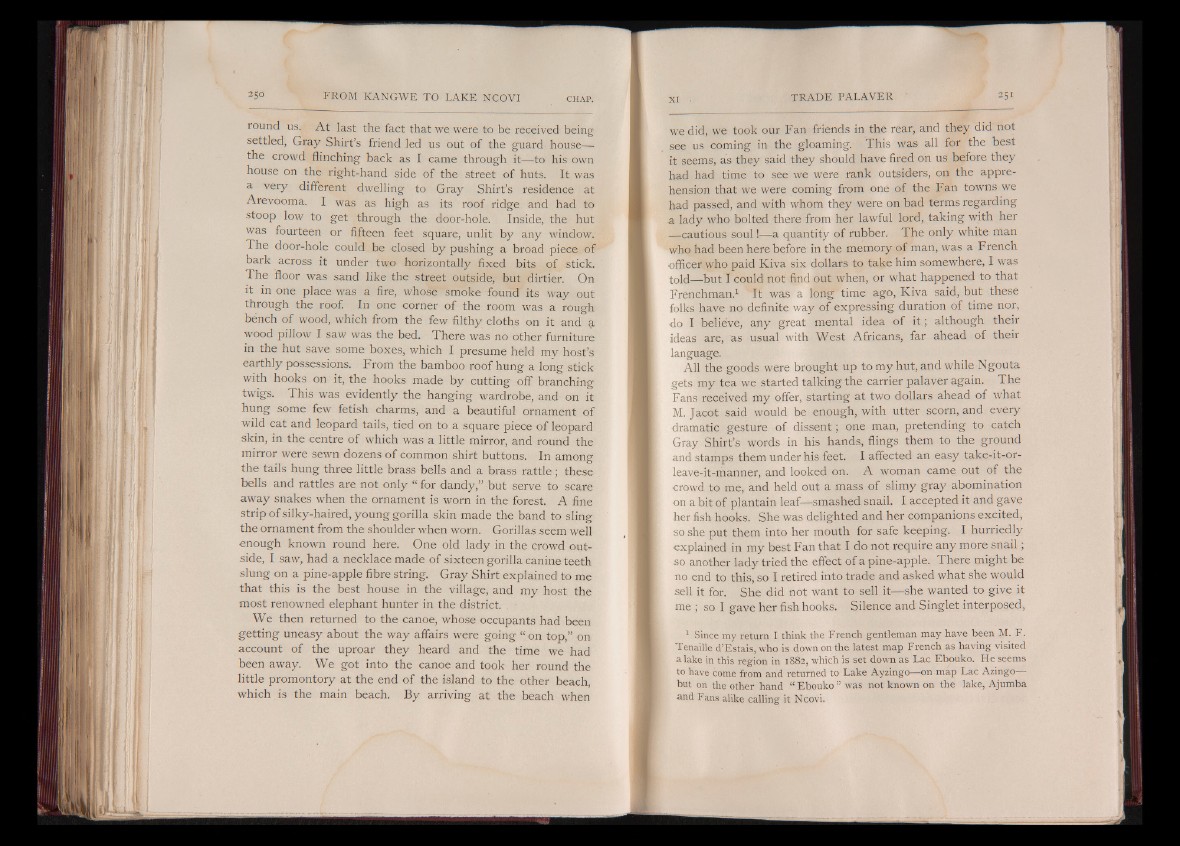
round us. A t last the fact that we were to be received being
settled, Gray Shirt’s friend led us out of the guard house—
the crowd flinching back as I came through it— to his own
house on the right-hand side of the street of huts. It was
a very different dwelling to Gray Shirt’s residence at
Arevooma. I was as high as its roof ridge and had to
stoop low to get through the door-hole. Inside, the hut
was fourteen or fifteen feet square, unlit by any window.
The door-hole could be closed by pushing a broad piece of
bark across it under two horizontally fixed bits of stick.
The floor was sand like the street outside, but dirtier. On
it in one place was a fire, whose smoke found its way out
through the roof. In one corner of the room was a rough
bench of wood, which from the few filthy cloths on it and a
wood pillow I saw was the bed. There was no other furniture
in the hut save some boxes, which I presume held my host’s
earthly possessions. From the bamboo roof hung a long stick
with hooks on it, the hooks made by cutting off branching
twigs. This was evidently the hanging wardrobe, and on it
hung some few fetish charms, and a beautiful ornament of
wild cat and leopard tails, tied on to a square piece of leopard
skin, in the centre of which was a little mirror, and round the
mirror were sewn dozens of common shirt buttons. In among
the tails hung three little brass bells and a brass rattle ; these
bells and rattles are not only “ for dandy,” but serve to scare
away snakes when the ornament is worn in the forest. A fine
strip of silky-haired, young gorilla skin made the band to sling
the ornament from the shoulder when worn. Gorillas seem well
enough known round here. One old lady in the crowd outside,
I saw, had a necklace made of sixteen gorilla canine teeth
slung on a pine-apple fibre string. Gray Shirt explained to me
that this is the best house in the village, and my host the
most renowned elephant hunter in the district.
We then returned to the canoe, whose occupants had been
getting uneasy about the way affairs were going “ on top,” on
account of the uproar they heard and the time we had
been away. We got into the canoe and took her round the
little promontory at the end of the island to the other beach,
which is the main beach. By arriving at the beach when
we did, we took our Fan friends in the rear, and they did not
see us coming in the gloaming. This was all for the best
it seems, as they said they should have fired on us before they
had had time to see we were rank outsiders, on the apprehension
that we were coming from one of the Fan towns we
had passed, and with whom they were on bad terms regarding
a lady who bolted there from her lawful lord, taking with her
— cautious soul!— a quantity of rubber. The only white man
who had been here before in the memory of man, was a French
officer who paid Kiva six dollars to take him somewhere, I was
told— but I could not find out when, or what happened to that
Frenchman.1 It was a long time ago, Kiva said, but these
folks have no definite way of expressing duration of time nor,
do I believe, any great mental idea of i t ; although their
ideas are, as usual with West Africans, far ahead of their
language.
All the goods were brought up to my hut, and while Ngouta
gets my tea we started talking the carrier palaver again. The
Fans received my offer, starting at two dollars ahead of what
M. Jacot said would be enough, with utter scorn, and every
dramatic gesture of dissent; one man, pretending to catch
Gray Shirt’s words in his hands, flings them to the ground
and stamps them under his feet. I affected an easy take-it-or-
leave-it-manner, and looked on. A woman came out of the
crowd to me, and held out a mass of slimy gray abomination
on a bit of plantain leaf—smashed snail. I accepted it and gave
her fish hooks. She was delighted and her companions excited,
so she put them into her mouth for safe keeping. I hurriedly
■explained in my best Fan that I do not require any more snail;
so another lady tried the effect of a pine-apple. There might be
no end to this, so I retired into trade and asked what she would
sell it for. She did not want to sell it— she wanted to give it
me ; so I gave her fish hooks. Silence and Singlet interposed,
1 Since my return I think the French gentleman may have been M. F.
Tenaille d’Estais, who is down on the latest map French as having visited
a lake in this region in 1882, which is set down as Lac Ebouko. He seems
to have come from and returned to Lake Ayzingo— on map Lac Azingo
but on the other hand “ Ebouko ” was not known on the lake, Ajumba
and Fans alike calling it Ncovi.